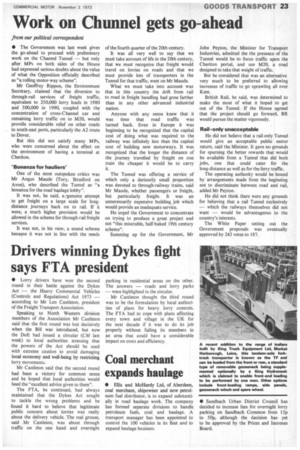Work on Chunnel gets go-ahead
Page 25

If you've noticed an error in this article please click here to report it so we can fix it.
from our political correspondent
• The Government was last week given the go-ahead to proceed with preliminary work on the Channel Tunnel — but only after MPs on both sides of the House had expressed serious doubts about the value of what the Opposition officially described as "a rolling motor-way scheme".
Mr Geoffrey Rippon, the Environment Secretary, claimed that the diversion to through-rail services of freight traffic, equivalent to 250,000 lorry loads in 1980 and 500,000 in 1990, coupled with the concentration of cross-Channel car and remaining lorry traffic on to M20, would provide considerable relief on other roads to south-east ports, particularly the A2 route to Dover.
But this did not satisfy many MPs, who were concerned about the effect on the environment of having a terminal at C heriton.
'Bonanza for hauliers' One of the most outspoken critics was Mr Angus Maude (Tory, Stratford on Avon), who described the Tunnel as "a bonanza for the road haulage lobby".
It was not, he said, a :-genuine attempt to get freight on a large scale for longdistance journeys back on to rail. If it were, a much higher provision would be allowed in the scheme for through-rail freight services.
It was not, in his view, a sound scheme because it was not in line with the needs of the fourth quarter of the 20th century.
It was all very well to say that we must take account of life in the 20th century, that we must recognize that freight would travel on lorries on roads and that we must provide lots of transporters in the Tunnel for that traffic, went on Mr Maude.
What we must take into account was that in this country the drift from rail to road in freight handling had gone farther than in any other advanced industrial nation.
Anyone with any sense knew that it was time that road traffic was turned back. Even in Europe it was beginning to he recognized that the capital cost of doing what was required to the railway was infinitely less than the capital cost of building new motorways. It was recognized that the longer the distance of the journey travelled by freight on one train the cheaper it would be to carry It.
The Tunnel was offering a service of which only a derisorily small proportion was devoted to through-railway trains, said Mr Maude, whether passengers or freight, but particularly freight. It was an unnecessarily expensive building job which would provide an inadequate service.
He urged the Government to concentrate on trying to produce a great project and not "this miserable, half-baked 19th century scheme".
Summing up for the Government, Mr John Peyton, the Minister for Transport Industries, admitted the the presence of the Tunnel would be to focus traffic upon the Cheriton portal, and use M20, a road designed to take that weight of traffic..
But he considered that was an alternative very much to be preferred to allowing increases of traffic to go sprawling all over Kent.
British Rail, he said, was determined to make the most of what it hoped to get out of the Tunnel. If the House agreed that the project should go forward, BR would pursue the matter vigorously.
Rail-only unacceptable
He did not believe that a rail only Tunnel would give an acceptable public sector return, said the Minister. It gave no grounds for spurning the better rewards that would be available from a Tunnel that did both jobs, one that could cater for the long-distance as well as for the ferry traffic.
The operating authority would be bound by arrangements made from the beginning not to discriminate between road and rail. added Mr Peyton.
He did not think there were any grounds for believing that a rail Tunnel exclusively — which the railways themselves did not want — would be advantageous to the country's interests.
The White Paper setting out the Government proposals was eventually approved by 243 votes to 187.
























































































































